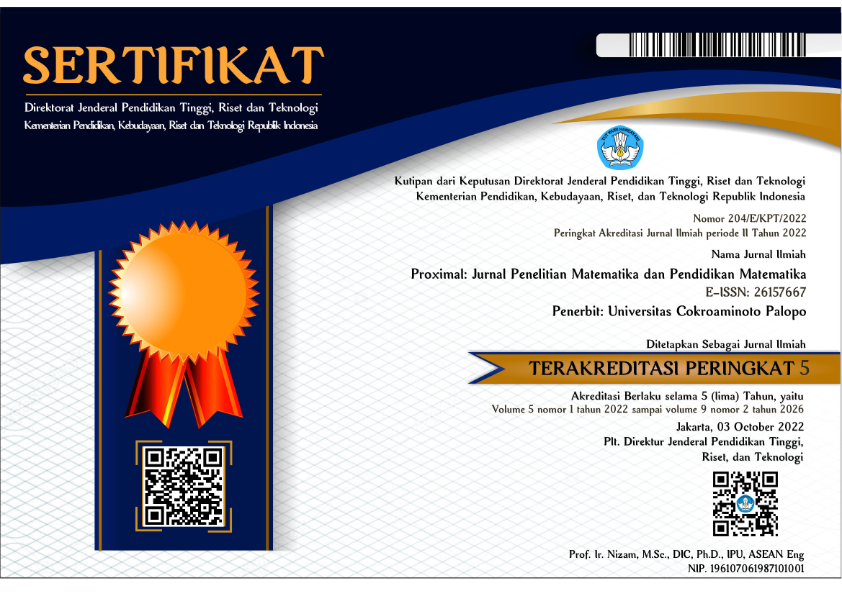Pembelajaran Konsep Perbandingan Berbasis STEAM melalui Eksperimen Waktu Tempuh Menggunakan Mobil-Mobilan
DOI:
https://doi.org/10.30605/proximal.v8i3.6642Keywords:
STEAM, Critical Thinking, Speed, Comparison, Experiment-based Learning, Mathematics Education, Science EducationAbstract
Pembelajaran berbasis STEAM mengintegrasikan lima bidang sains untuk menciptakan proses pembelajaran yang lebih kontekstual dan aplikatif. Penelitian ini bertujuan untuk menganalisis kemampuan berpikir kritis siswa melalui eksperimen pengukuran waktu tempuh menggunakan mobil-mobilan. Penelitian dilakukan dengan metode deskriptif kualitatif dan pendekatan studi kasus pada siswa kelas VIII SMP Kartika XX-1 Makassar. Data diperoleh melalui observasi, tes tertulis, dan wawancara mendalam. Hasil penelitian menunjukkan bahwa eksperimen ini membantu siswa memahami konsep kelajuan dan perbandingan, serta mendorong mereka untuk berpikir kritis melalui observasi dan analisis data. Meskipun beberapa kelompok mengalami kendala dalam pencatatan data dan interpretasi hasil eksperimen, kegiatan ini terbukti dapat meningkatkan partisipasi aktif dan kemampuan berpikir kritis siswa. Penelitian ini memberikan rekomendasi bagi guru dan peneliti lain dalam mengembangkan pembelajaran berbasis eksperimen yang dapat meningkatkan mutu pendidikan secara lebih interaktif dan aplikatif.
References
Ariadila, S. N., Silalahi, Y. F. N., Fadiyah, F. H., Jamaludin, U., & Setiawan, S. (2023). Analisis pentingnya keterampilan berpikir kritis terhadap pembelajaran bagi siswa. Jurnal Ilmiah Wahana Pendidikan, 9(20), 664-669. https://doi.org/10.5281/zenodo.8436970
Buinicontro, J. K. (2018). Gathering STE(A)M: Policy, Curricular, And Programmatic Developments In Arts-Based Science, Technology, Engeneering, And Mathematics Education Introduction To Special Issue Of Art Education Policy Review. STEAM Focus. Art Education Policy Review Journal. 119. DOI: https://doi.org/10.1080/10632913.2017.1407979
Fitriyah, A., & Ramadani, S. D. (2021). Pengaruh pembelajaran STEAM berbasis PjBL (Project-Based Learning) terhadap keterampilan berpikir kreatif dan berpikir kritis. Inspiratif Pendidikan, 10(1), 209-226.
Hobbs, P. V. (2000). Basic physical chemistry for the atmospheric sciences. Cambridge University Press. DOI: https://doi.org/10.1017/CBO9780511802423
Johar, Erni., Sulistyono. Hindriana, Anna Fitri. (2019). Implementasi Praktikum Berbasis Inkuiri Terbimbing untuk Meningkatkan Hasil Belajar dan Sikap Ilmiah Siswa. Jurnal Edubiologica. 6(2). 90-93. DOI: https://doi.org/10.25134/edubiologica.v6i2.2368
Nurhikmayati, I. (2019). Implementasi STEAM dalam pembelajaran matematika. Jurnal Didactical Mathematics, 1(2), 41-50. DOI: https://doi.org/10.31949/dmj.v1i2.1508
Shadiq, F. (2019). Pembelajaran Matematika pada Era Industri 4.0. Suatu Tantangan Bagi Guru dan Pendidik Matematika. Prosiding Pada Seminar Nasional Penelitian Pendidikan Matematika UMT.
Van Laar, E., van Deursen, A. J., van Dijk, J. A., & De Haan, J. (2019). Determinants of 21st-century digital skills: A large-scale survey among working professionals. Computers in human behavior, 100, 93-104. DOI: https://doi.org/10.1016/j.chb.2019.06.017
Wijaya, A. (2015). Pendidikan Matematika Realistik: Suatu Alternatif Pendekatan Pembelajaran Matematika. Yogyakarta: Graha Ilmu.
Zubaidah, S. (2019, October). Memberdayakan keterampilan abad ke-21 melalui pembelajaran berbasis proyek. In Seminar Nasional Nasional Pendidikan Biologi (Vol. 1, No. 2, pp. 1-19).
Downloads
Published
Issue
Section
License
Copyright (c) 2025 Mar Athul Wazithah T., Dwi Ariesta, Faiza Dwi Nayla K, Nurmadina Nurmadina, Risma Risma, Nurwati Djam’an

This work is licensed under a Creative Commons Attribution 4.0 International License.
In submitting the manuscript to the journal, the authors certify that:
- They are authorized by their co-authors to enter into these arrangements.
- The work described has not been formally published before, except in the form of an abstract or as part of a published lecture, review, thesis, or overlay journal.
- That it is not under consideration for publication elsewhere,
- That its publication has been approved by all the author(s) and by the responsible authorities – tacitly or explicitly – of the institutes where the work has been carried out.
- They secure the right to reproduce any material that has already been published or copyrighted elsewhere.
- They agree to the following license and copyright agreement.
License and Copyright Agreement
Authors who publish with this journal agree to the following terms:
- Authors retain copyright and grant the journal right of first publication with the work simultaneously licensed under Creative Commons Attribution License (CC BY 4.0) that allows others to share the work with an acknowledgment of the work's authorship and initial publication in this journal.
- Authors are able to enter into separate, additional contractual arrangements for the non-exclusive distribution of the journal's published version of the work (e.g., post it to an institutional repository or publish it in a book), with an acknowledgment of its initial publication in this journal.
- Authors are permitted and encouraged to post their work online (e.g., in institutional repositories or on their website) prior to and during the submission process, as it can lead to productive exchanges, as well as earlier and greater citation of published work.















